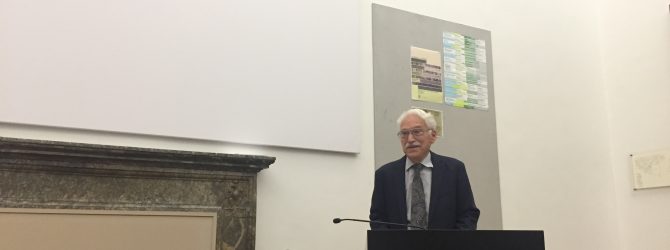In front of a crowd of Cornell in Rome students and faculty, Dr. Bill Goldsmith, author of “Saving Our Cities,” described the four reasons why American cities are “in very bad shape” on Monday evening. The lecture had a mostly bleak tone on the present state of American urban areas, but it was sprinkled with occasional optimistic remarks.
Dr. Goldsmith, a professor emeritus of CRP, cited deteriorating schools, urban food deserts, a failing war on drugs and rapidly increasing austerity as reasons why cities have struggled considerably in recent years.
According to Dr. Goldsmith, millions of urban children are deprived of good schools. The schools they do have access to have high dropout rates, low test scores and low college matriculation. Dr. Goldsmith disproved the oft-repeated narrative blaming poor teachers and lazy administration in these urban schools. He invoked “Schooling in Capitalist America,” a 1976 book that centers on the concept that schools are created to divide the country into, as Dr. Goldsmith put it bluntly, winners and losers.
Dr. Goldsmith also pointed to the scarcity of healthy food in urban areas as a reason why cities are failing in the United States. He contended that in certain parts of cities, it’s easy and cheap to get junk food and comparatively difficult and expensive to buy fresh fruits and vegetables. Obesity in America has increased rapidly recently, especially among African American and Latino populations.
This discussion led to a rare moment of optimism in Dr. Goldsmith’s lecture. He drew our attention to the flurry of mainstream coverage of these American food issues in the past 15 years — movies like Food Inc. and books like “Fast Food Nation” made headlines when they were released. Dr. Goldsmith said this activity in the media marks the beginning of structural change in food policies in the US.
Dr. Goldsmith got particularly animated in the third segment of the lecture: his discussion of drugs in cities. The drug war, according to Dr. Goldsmith, is racist and xenophobic. He mentioned that the war on drugs has had no effect on consumption of these illicit substances and has instead broken down families and caused increase violence.
He brought up the concept of “million dollar blocks,” which is when the annual cost of holding an inmate in jail is multiplied by the number of incarcerated persons on a given city block. There are many blocks in the US in which the product of these numbers is over one million dollars. Dr. Goldsmith argued that, if drugs were legal, that money could be better spent on social programs.
In the final part of his lecture, Dr. Goldsmith briefly addressed the issue of austerity, the tightening of budgets of local governments, a topic Professor Mildred Warner has brought up several times in the Rome Workshop. He argued that city budgets are cut whenever state budgets are tightened, and then when city programs fail because of this lack of funding, then cities are portrayed as wastes of money, and budgets are cut further.
Before the end of Dr. Goldsmith’s lecture, Professor Warner stopped him and asked for some sort of positive takeaway from his relatively pessimistic lecture. Dr. Goldsmith responded by saying that these issues are not getting swept under the rug and instead are at the forefront of political headlines. He said that, while the prospects of fixing some of these issues may be bleak at the federal and state level, city governments still have power and are “pushing” for progressive changes.


